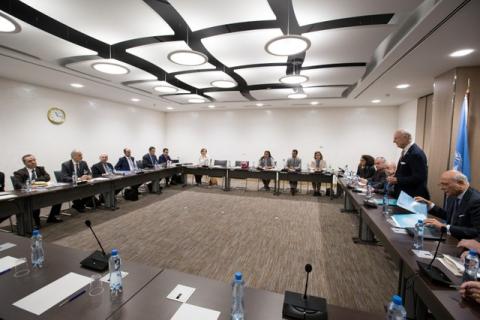Advertisement
U.N. brings Syria talks under one roof, not yet into one room
GENEVA (Reuters) - Representatives of Syria's warring sides sat just meters apart in separate rooms at U.N. peace talks on Thursday, but mediator Staffan de Mistura stopped short of bringing them together in what diplomats had hoped might be a minor breakthrough.
Previous rounds of talks have gone almost nowhere, with de Mistura shuttling between hotels and meeting multiple delegations separately. A newly unified opposition had raised the possibility of face-to-face talks to speed up the talks.
Although the two delegations were in the U.N. building concurrently, de Mistura kept them apart, dashing between their respective meeting rooms on either side of a corridor.
"We are having what we would call close proximity parallel meetings," he told the opposition team, after making similar comments to the government delegation, promising to leave them in the hands of his deputy while he went to meet their enemies.
After several hours of talks, chief government negotiator Bashar al-Ja'afari and his opposition counterpart Nasr Hariri left separately, without commenting to the media.
Hariri told Reuters on Wednesday that he was ready for direct talks and was prepared to negotiate with no preconditions to end the six-year war.
He said his first words to Ja'afari would be: "Despite all of the crimes which have been done in Syria, I hope that the regime can come ready to put the people of Syria first."
If the two sides do meet, it will not be their first time in the same room. In February, de Mistura infuriated Ja'afari by inviting both sides to a ceremony to inaugurate the talks.
On that occasion, as de Mistura warmly embraced the opposition delegates, whom the government of President Bashar al-Assad regards as terrorists, Ja'afari and his team walked out of the room without turning back.
One Western diplomat predicted fireworks if the two sides sat down to talk at last, almost seven years into Syria's war, but he said the "sponsor" countries backing the talks - including Russia and the United States - would then force them back to the table, and the pressure would gradually be released.
A European diplomat expected the opposition to be "pragmatic and flexible" but there was little chance of a big breakthrough.
"I think we need baby steps, and we’ve made such little progress in the years gone by, largely because of the regime’s reluctance to engage in this, so to make some small steps now and develop some momentum would be very helpful indeed.”
Hundreds of thousands of people have died in Syria's civil war and more than 11 million have been driven from their homes. Previous rounds of talks have faltered over the opposition's demand that Assad leave power and his refusal to go.
Over the past two years, since Russia joined the war on the government side, Assad and his allies have recaptured all major towns and cities from the rebels.
There has been some speculation ahead of this week's round of talks that the opposition could soften its demands in light of the government's success on the battlefield. However, at a meeting before the talks began, opposition delegates stuck by their demand that Assad be excluded from any transitional government under a future peace deal.
(Writing by Tom Miles, additonal reporting by Marina Depetris in Geneva and Angus McDowall in Beirut; Editing by William Maclean and Peter Graff)



















Add new comment